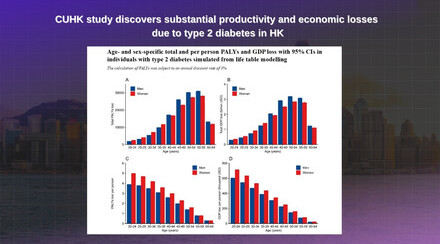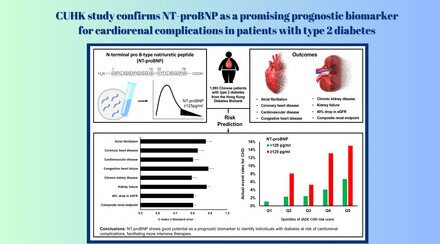CUHK study shows few patients with type 2 diabetes can achieve diabetes remission in real-world settings through weight loss at early stage and eventually stop medications
Type 2 diabetes has traditionally been considered an irreversible condition requiring lifelong drug treatment for glucose control. However, recent clinical trials have shown that remission of type 2 diabetes, defined as a return to normal blood glucose levels without the need for drug therapy, can be achieved following sustained weight loss. A study conducted by The Chinese University of Hong Kong (CUHK)’s Faculty of Medicine (CU Medicine) showed that weight loss within the first year after diabetes diagnosis increased the likelihood of achieving diabetes remission although the overall remission rate remained low in real-world settings. The findings have been published in the international medical journal PLOS Medicine.

A CU Medicine study showed that weight loss within the first year after diabetes diagnosis increased the likelihood of achieving diabetes remission, defined as a return to normal blood glucose levels without the need for drug therapy, although the overall remission rate remained low in real-world settings. (From left) Professor Andrea Luk, lead investigator of the research; Dr Wu Hongjiang, Research Assistant Professor;and Professor Juliana Chan, Chair Professor of Medicine and Therapeutics in the Department of Medicine and Therapeutics at CU Medicine.
Rate of diabetes remission remains low in real-world settings
The Diabetes and Endocrinology Research Team at CU Medicine analysed data from 37,000 population-based patients with newly diagnosed type 2 diabetes in Hong Kong Hospital Authority database and found that compared to those who had gained weight, patients who lost ≥10% of their body weight in the first year after being diagnosed with type 2 diabetes were three times more likely to achieve diabetes remission, while those who lost 5-10% were twice as likely to do so. Moreover, patients who experienced diabetes remission had a 30% reduced risk of all-cause mortality compared to those who did not. These findings provide evidence for implementation of early weight management interventions as diabetes remission initiatives.
Professor Andrea Luk On-yan, Professor in the Department of Medicine and Therapeutics at CU Medicine, and the lead investigator of the research, said, “Although our study demonstrated that diabetes remission was achievable in real-world settings, the overall incidence of diabetes remission was very low. In the Diabetes Remission Clinical Trial conducted in the UK, approximately half of the obese participants with type 2 diabetes achieved an average blood glucose level (HbA1c) of less than 6.5% without the use of glucose-lowering drugs after intensive weight management intervention over a 12-month period. However, only 6% of newly diagnosed patients achieved remission in real-world settings during a median follow-up of eight years in our study, translating to a rate of less than 1% per year.”
She continued, “One of the possible explanations for the discrepancy between our study and clinical trials was that the intensive lifestyle interventions and holistic management approaches of clinical trials were not mirrored in real-world environments. Innovative weight management strategies, which have proven effective for diabetes remission in recent clinical trials, were neither implemented nor available in real-world settings in our locality.”
Long-term commitment to healthy lifestyle and weight management is crucial to sustain diabetes remission
The study further showed that maintaining long-term diabetes remission was challenging. Among patients who achieved remission, about 20% of them returned to hyperglycaemia annually. Dr Wu Hongjiang, Research Assistant Professor in the Department of Medicine and Therapeutics at CU Medicine, said, “The low remission rate and the difficulty in maintaining remission reflect the complex nature of diabetes. Sustaining long-term diabetes remission may require a comprehensive and multifaceted approach that includes an ongoing commitment to a healthy lifestyle and weight management with maintenance of near normoglycaemia.”
Professor Juliana Chan Chung-ngor, Chair Professor of Medicine and Therapeutics at CU Medicine, said, “Given the low incidence of diabetes remission and the difficulty in maintaining it, both clinicians and patients should set realistic expectations for it. It is important to prioritise the global effort of using both public and personalised measures to prevent the onset of diabetes.”
Professor Luk added, “The CUHK team is now developing innovative, multi-component, community-based diabetes prevention strategies as a long term solution to reduce the burden of diabetes.”
The study’s DOI is: 10.1371/journal.pmed.1004327.









































